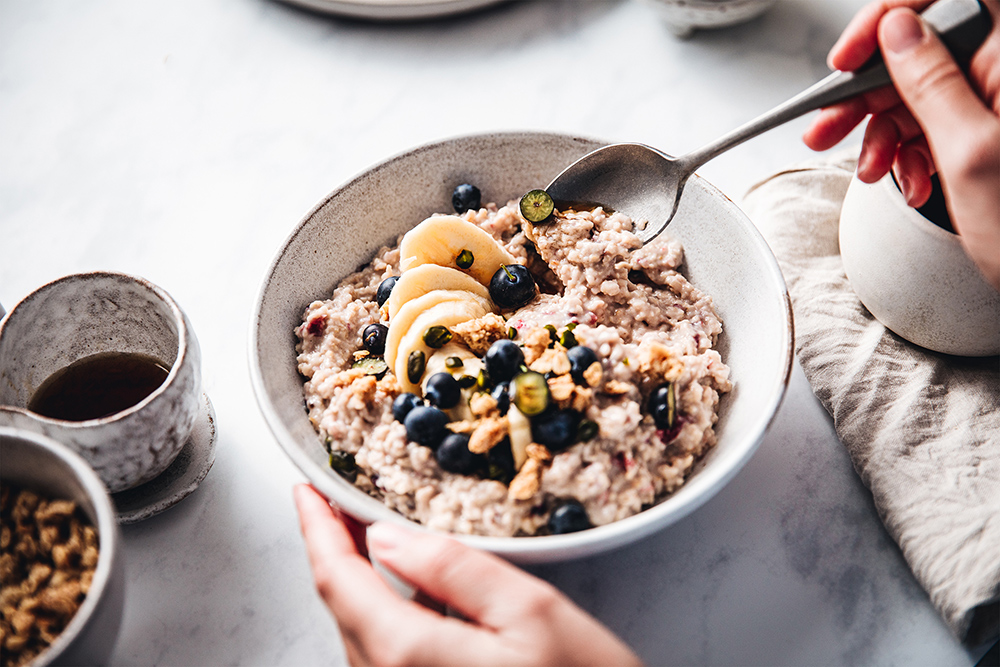
忙碌的早晨讓我們急匆匆出門,沒有時間吃早餐,有接近25%的美國人不吃早餐。而不吃早餐可能產生長期的負面后果。
匆匆忙忙地吃飯和晚上大吃一頓,已經是司空見慣的事情。但科學研究發現,早餐吃得像國王,午餐吃得像王子,晚餐吃得像乞丐,這可能是更健康、更長壽生活的秘訣。這種飲食方式甚至可以讓你長命百歲。
2022年公布的一項研究分析了9項壽命營養學研究,即不同時間的飲食方式對精力和健康結果的影響。分析發現,早餐吃得最豐盛的人,膽固醇和血壓指標都有所改善,并且減重幅度更大,而體重下降可以降低導致過早死亡的心臟病和糖尿病風險。
而晚上攝入更多食物,尤其是在睡前兩個小時內用餐,導致人體更難代謝食物,會帶來慢性病風險。這樣做還有可能導致更難入睡和保持睡眠狀態。
因此,即使在最忙碌的時候,也不要不吃早餐。
如何像長壽地區一樣吃早餐
在長壽地區,如希臘伊卡里亞、意大利撒丁島和哥斯達黎加尼科亞等在長壽研究中排在前列的區域,當地居民通常在早上吃得更豐盛,或者更早吃晚餐。
在Blue Zones網站上有一篇帖子寫道:“尼科亞人經常吃兩頓早餐,晚上吃簡餐。而在伊卡里亞和撒丁島,午餐是重要的一餐。許多基督復臨論者遵循‘早餐吃得像國王’的原則,每天只吃兩頓,一頓是在上午十點左右,另外一頓在下午4點左右。”
雖然長壽地區居民有各種各樣的菜單,但比較常見的是超加工食品較少,且富含蛋白質、纖維和復合碳水化合物的飲食。許多長壽地區的居民早餐中包含完整食材、蛋白質和各種營養物質。
帖子中還寫道:“長壽地區的早餐與美國人標準的雞蛋加培根的早餐有很大區別。在哥斯達黎加,豆類是最常見的早餐之一,而在沖繩,大醬湯和大米很受歡迎。在[加州]羅馬琳達,百歲老人們的早餐豐盛,經常吃麥片粥或者非傳統的炒豆腐。”
雖然上夜班的上班族和作息不固定的人可能很難控制自己的用餐時間,但在上床睡覺之前選擇有營養的食物和健康飲食,依舊會帶來改變。
為什么用餐時間至關重要?
最近在《細胞代謝》(Cell Metabolism)發表的一篇研究論文在控制體育鍛煉、睡眠和日照的情況下,按不同間隔為研究參與者提供同樣的食物,研究發現,用餐時間較晚,會降低與飽腹感有關的激素水平。用餐時間較晚的一組受試者,燃燒的卡路里少于較早用餐的受試者,而且兩組受試者與脂肪存儲有關的基因也存在差異。
從事該項研究的弗蘭克·希爾博士和尼娜·武喬維奇博士之前曾對《財富》雜志表示:“這些變化可以解釋,其他研究報告提出的較晚用餐與肥胖風險增加之間存在聯系的原因,并從生物學的角度為研究這些潛在機制提供了洞察。”
有一種解釋是,每天人體新陳代謝水平始終在變化。早上攝入最多食物,符合我們的生理節律或自然生物鐘。研究顯示,有助于睡眠的激素褪黑素可能降低葡萄糖耐受性,并解釋了為什么人體更難代謝深夜攝入的食物。
但你不需要為了學習長壽地區居民的做法,而大幅度調整自己的作息表。有些習慣可能適合某些人,但并不適合所有人。長壽專家和《長壽地區》(The Blue Zones)一書的作者丹·比特納對《財富》雜志表示,另外一種優先考慮健康和長壽的方式是吃簡單美味、容易烹飪的食物。
他說道:“人們往往想到的是價格昂貴的高檔食物,甚至昂貴的新鮮農產品,許多美國人根本吃不到這些食材。在長壽地區,人們吃的是農家菜,也就是說他們食用的是在空地種植的豆類和綠葉菜以及全谷物食品,這些食品價格低廉。你可以大量采購。”(財富中文網)
翻譯:劉進龍
審校:汪皓
忙碌的早晨讓我們急匆匆出門,沒有時間吃早餐,有接近25%的美國人不吃早餐。而不吃早餐可能產生長期的負面后果。
匆匆忙忙地吃飯和晚上大吃一頓,已經是司空見慣的事情。但科學研究發現,早餐吃得像國王,午餐吃得像王子,晚餐吃得像乞丐,這可能是更健康、更長壽生活的秘訣。這種飲食方式甚至可以讓你長命百歲。
2022年公布的一項研究分析了9項壽命營養學研究,即不同時間的飲食方式對精力和健康結果的影響。分析發現,早餐吃得最豐盛的人,膽固醇和血壓指標都有所改善,并且減重幅度更大,而體重下降可以降低導致過早死亡的心臟病和糖尿病風險。
而晚上攝入更多食物,尤其是在睡前兩個小時內用餐,導致人體更難代謝食物,會帶來慢性病風險。這樣做還有可能導致更難入睡和保持睡眠狀態。
因此,即使在最忙碌的時候,也不要不吃早餐。
如何像長壽地區一樣吃早餐
在長壽地區,如希臘伊卡里亞、意大利撒丁島和哥斯達黎加尼科亞等在長壽研究中排在前列的區域,當地居民通常在早上吃得更豐盛,或者更早吃晚餐。
在Blue Zones網站上有一篇帖子寫道:“尼科亞人經常吃兩頓早餐,晚上吃簡餐。而在伊卡里亞和撒丁島,午餐是重要的一餐。許多基督復臨論者遵循‘早餐吃得像國王’的原則,每天只吃兩頓,一頓是在上午十點左右,另外一頓在下午4點左右。”
雖然長壽地區居民有各種各樣的菜單,但比較常見的是超加工食品較少,且富含蛋白質、纖維和復合碳水化合物的飲食。許多長壽地區的居民早餐中包含完整食材、蛋白質和各種營養物質。
帖子中還寫道:“長壽地區的早餐與美國人標準的雞蛋加培根的早餐有很大區別。在哥斯達黎加,豆類是最常見的早餐之一,而在沖繩,大醬湯和大米很受歡迎。在[加州]羅馬琳達,百歲老人們的早餐豐盛,經常吃麥片粥或者非傳統的炒豆腐。”
雖然上夜班的上班族和作息不固定的人可能很難控制自己的用餐時間,但在上床睡覺之前選擇有營養的食物和健康飲食,依舊會帶來改變。
為什么用餐時間至關重要?
最近在《細胞代謝》(Cell Metabolism)發表的一篇研究論文在控制體育鍛煉、睡眠和日照的情況下,按不同間隔為研究參與者提供同樣的食物,研究發現,用餐時間較晚,會降低與飽腹感有關的激素水平。用餐時間較晚的一組受試者,燃燒的卡路里少于較早用餐的受試者,而且兩組受試者與脂肪存儲有關的基因也存在差異。
從事該項研究的弗蘭克·希爾博士和尼娜·武喬維奇博士之前曾對《財富》雜志表示:“這些變化可以解釋,其他研究報告提出的較晚用餐與肥胖風險增加之間存在聯系的原因,并從生物學的角度為研究這些潛在機制提供了洞察。”
有一種解釋是,每天人體新陳代謝水平始終在變化。早上攝入最多食物,符合我們的生理節律或自然生物鐘。研究顯示,有助于睡眠的激素褪黑素可能降低葡萄糖耐受性,并解釋了為什么人體更難代謝深夜攝入的食物。
但你不需要為了學習長壽地區居民的做法,而大幅度調整自己的作息表。有些習慣可能適合某些人,但并不適合所有人。長壽專家和《長壽地區》(The Blue Zones)一書的作者丹·比特納對《財富》雜志表示,另外一種優先考慮健康和長壽的方式是吃簡單美味、容易烹飪的食物。
他說道:“人們往往想到的是價格昂貴的高檔食物,甚至昂貴的新鮮農產品,許多美國人根本吃不到這些食材。在長壽地區,人們吃的是農家菜,也就是說他們食用的是在空地種植的豆類和綠葉菜以及全谷物食品,這些食品價格低廉。你可以大量采購。”(財富中文網)
翻譯:劉進龍
審校:汪皓
Busy mornings can leave us rushing out the door without making time for breakfast—nearly 25% of Americans forgo this meal. And that could have negative long-term consequences.
Eating on the go and saving your biggest meal for late in the day has become commonplace. But science has found that eating breakfast like a king, lunch like a prince, and dinner like a pauper might be the key to living longer, healthier lives. It might even help you reach 100.
Research published in 2022 analyzed nine studies on chrononutrition, or how eating at different times affects energy and health outcomes. The analysis found those who ate the most toward the earlier morning had improved cholesterol and blood pressure metrics and lost more weight, which can reduce the risk of heart problems and diabetes that lead to earlier mortality.
Saving larger meals for the evening hours, specifically eating within two hours of going to bed can make it harder for the body to metabolize the food, putting people at risk for chronic health problems. It can also make falling and staying asleep more challenging.
So even on your craziest days, you don’t want to skip breakfast.
How to eat breakfast like you live in a blue zone
Those living in the world’s blue zones—the areas at the forefront of longevity research, like Ikaria, Greece; Sardinia, Italy; and Nicoya, Costa Rica—also tend to eat more filling meals earlier in the day or have earlier dinners.
“Nicoyans often eat two breakfasts with a light dinner; Ikarians and Sardinians make lunch the big meal of the day,” reads a post on the Blue Zones website. “Many Adventists who follow the ‘breakfast like a king’ rule eat only two meals a day, one midmorning and another around 4 p.m.”
While those living in the blue zones eat varied menus, a common thread among them is meals low in ultra-processed foods and rich in protein, fiber, and complex carbohydrates. Many residents of blue zones also eat breakfasts filled with whole ingredients, protein, and nutrients.
“Breakfast in the blue zones looks vastly different than the standard American breakfast of eggs and bacon,” the post continues. “Beans are a common breakfast staple in Costa Rica, while miso soup and rice are popular in Okinawa. In Loma Linda, [Calif.], centenarians often eat a hearty breakfast of oatmeal or a somewhat nontraditional tofu scramble.”
While late-shift workers and those on varied schedules may have little control over mealtimes, choosing nutritious foods and eating well before bed can still make a difference.
Why do mealtimes matter?
Another recent study published in Cell Metabolism that controlled for exercise, sleep, and light exposure—and gave participants the same food but at varying intervals—found that eating later decreased the hormone related to feelings of fullness. The later-eating group also burned fewer calories than the earlier ones, and genes related to fat storage differed between the groups.
“Together, these changes may explain why late eating is associated with increased obesity risk reported by other studies and provide new biological insight into the underlying mechanisms,” researchers on the study Dr. Frank Scheer and Dr. Nina Vujovi? previously told Fortune.
One explanation is how our body’s metabolism changes throughout the day. Consuming most of our food earlier in the day aligns with our circadian rhythm or natural body clock. Research suggests melatonin, the hormone released for sleep, may decrease glucose tolerance and explain why the body has a more difficult time metabolizing late-night meals.
However, you don’t need to overhaul your schedule to follow the blue-zone way. Some habits may work for some, but not for all. Another way to prioritize health and longevity is by eating simple, easy-to-cook, and delicious foods, longevity expert and author of The Blue Zones Dan Buettner previously told Fortune.
“People tend to think [of] the expensive super foods, or even expensive fresh produce, which is out of reach for a lot of Americans,” he says. “In a blue zone, people are eating peasant food, so they’re eating the beans and the greens that are growing in vacant lots and whole grains, which are cheap. You can buy those in bulk.”






